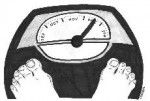LACERDA: To lower cancer risk, fight fat this winter

November 18, 2009
With the arrival of low temperatures and spreading illnesses, students find it more appropriate to spend time indoors, avoiding contact with people and the cold. The winter season requires us to use household commodities as a substitute for outside activities.
Who really wants to go for a two-mile jog around the neighborhood when you have the new Beatles Rock Band or the latest Grand Theft Auto on standby?
The problem arises, however, when indoor leisure becomes more of a priority than exercise. Although certainly an advocate of “couch time,” I question when people choose to forget their health amidst binges of substance abuse and video gaming.
The wind chill factor, thermometer or presence of snow should not mislead us into becoming lethargic robots.
While the Philadelphia weather is not as brutal as that of our surrounding states, it does have its occasional snowfall that scares many people away from facing Mother Nature. But the availability of local fitness centers negates all the evidence for residence hall confinement.
A recent study by the American Institute for Cancer Research concluded that 100,000 cases of cancer each year are caused by excess body fat. The report states that 49 percent of endometrial cancers are caused by excess body fat. This is followed by 35 percent of esophageal cancer cases; 28 percent of pancreatic cancer cases; 24 percent of kidney cancer cases; 21 percent of gallbladder cancer cases; 17 percent of breast cancer cases; and 9 percent of colorectal cancer cases.
What does this all mean? Obesity increases the risk for cancer and can severely threaten survival and make treatment for such diseases incredibly difficult.
In order to combat these issues, people should get out more, even if it’s just a drive to the Davis Center. Of course, other factors are involved besides exercise, and these can be difficult to fight. But constant mobility increases life expectancy. The winter months can make such activity rather challenging with the absence of hot nights and hazy days.
It is during this time that people choose negative alternatives that become habits. “Chilling” is great, but too much is hazardous.
The studies from the institute have also shown that increased body fat can lead to increased levels of oxidative stress and inflammatory compounds in the blood. These are linked to DNA mutation and diseased cell growth, present in many cancers. Obesity also causes heart disease, high blood pressure, high cholesterol, diabetes, gallbladder disease, sleep apnea and strokes. Many people are aware of these conditions but do not enact solutions. I think that exercise is a key ingredient in the fight against obesity.
For the most part, weather conditions here allow for some year-long activities. Training in the cold requires more stamina and endurance, which is invaluable to conditioning. Regardless, the presence of indoor fitness centers remains pertinent even in the iciest conditions and should be utilized as much as possible. As November comes into full swing, frigid air will make La-Z-Boys and futons our best friends. Furniture can be a necessary medicine for stress, but it is also a trap for over-indulgence.
The report from the institute signifies a major point in cancer research, as we now have more reason to battle such difficulties. It does not, however, provide any solutions to the problem; it merely clarifies it.
Continued research should be placed in programs that have examined similar cases. Greater awareness is an essential project. Maintaining caloric balance is aided by sit-ups and push-ups, not galactic battles in fantasy worlds. Do not be swayed by the cold weather. Hit the gym. Your health is your greatest asset.
——————-
John LaCerda is a senior English major from Medfield, Mass. He can be reached at [email protected].










